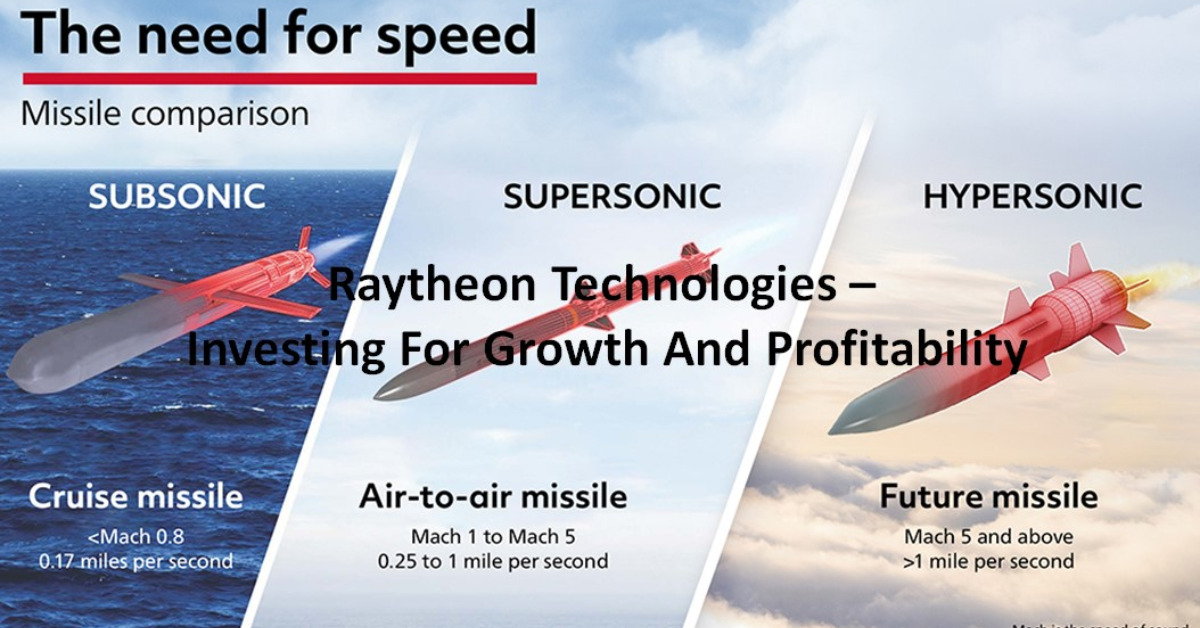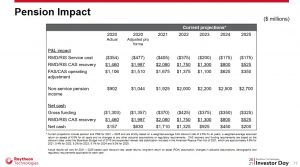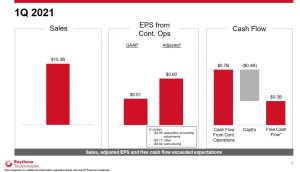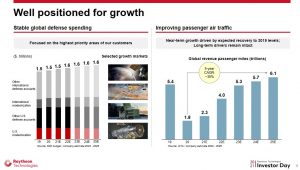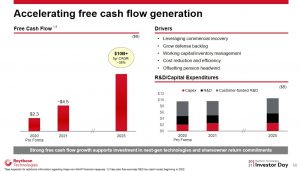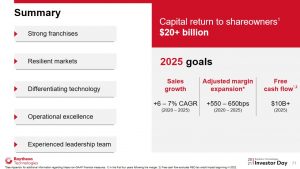Contents
On May 17th I wrote an article in which I analyzed Lockheed Martin. On May 18th, Raytheon Technologies (RTX) held its 2021 Investor Day; it is a significant Lockheed Martin competitor. At this Investor Day, members of senior management outlined how Raytheon Technologies is investing for growth and profitability to generate attractive shareholder returns.
In this article, I look at RTX's current valuation based on guidance and provide my opinion on whether to acquire shares.
The comments in my recent LMT article vis-a-vis the:
- US National Defense Budget;
- Impending Changes In The Treatment of R&D From A Tax Perspective;
- Potential Increase In Corporate Tax Rates; and
- Pension Relief Act
are also pertinent to RTX.
Business Overview
RTX is an aerospace and defense company that provides advanced systems and services for commercial, military and government customers worldwide. Its operations are classified into four principal business segments:
- Collins Aerospace Systems;
- Pratt & Whitney;
- Raytheon Intelligence & Space; and
- Raytheon Missiles & Defense.
Each segment is comprised of groups of similar operations.
RTX generates substantial US government sales through all 4 business segments. Raytheon Intelligence & Space and Raytheon Missiles & Defense together represent a significant portion of these sales.
RTX is also a global company and all 4 business segments have substantial international sales.
A comprehensive overview of RTX can be found on the company's website. Additional information is found in Part 1 Item 1 within the 2020 10-K.
The Risk Factors section immediately follows the Business Overview section within the 10-K. In this section, various risks are described that could impact RTX's business, financial condition, operating results and cash flows.
Pension Relief Act
In my recent LMT article, I briefly touched upon the positive impact the recently enacted American Rescue Plan Act of 2021 stimulus package is having on companies. This Act provides funding relief for single-employer pension plans in the form of interest rate stabilization and extending the period for amortizing funding shortfalls.
As with LMT, RTX stands to benefit from the recent enactment of this Act.
RTX does not see the need to do any domestic pension funding in the near term. In 2020, RTX pre-funded $0.8B toward its 2021 contribution so there is no impact to RTX as a result of the passing of this Act. However, RTX's funding requirements in the next few years will be reduced thus enabling it to deploy this additional net cash toward value-enhancing strategies.
Q1 2021 Results and FY2021 Guidance
On April 27, 2021, RTX released its Q1 results and accompanying Earnings Presentation.
In October 2020, after a strategic review, RTX announced its intent to sell Forcepoint, its cybersecurity subsidiary to tech-heavy private equity firm Francisco Partners; RTX had been working to divest itself of various business units as a result of its merger with United Technologies Corp.
RTX acquired an 80% stake in Forcepoint, then known as Websense, for $1.9B in 2015 from Vista Equity Partners. In early 2020, RTX acquired the remaining Vista stake in Forcepoint for $0.588B.
The sale of Forcepoint was completed on January 8, 2021, for proceeds of $1.0B. On December 31, 2020, the related assets of ~$1.9B and liabilities of ~$0.855B were reflected in RTX's 10-K.
The rate of vaccine distribution and signs of travel recovery within key domestic markets are better than what RTX expected 3 months ago. In the US, daily TSA traffic has averaged 1.4 million people a day since the beginning of April; this is nearly double the levels of January 2021. Key metrics are improving but RTX continues to monitor recovery around the world and maintains close contact with customers as they prepare for recovery.
Free Cash Flow
FY2021 free cash flow guidance remains at a minimum of $4.5B.
RTX's strong FCF provides it with flexibility when it comes to:
- reinvesting in the business;
- debt repayment;
- share buybacks; and
- dividend increases.
Merger Synergies
At the May 18, 2021 Investor Day, RTX's EVP and Chief Transformation Officer indicated the company continues to execute well on its synergy programs. In Q1, RTX achieved nearly $0.2B of incremental RTX merger synergies, bringing the total since the merger up to $0.44B.
Given the strong synergy capture to date and the growing opportunities in the pipeline, RTX is increasing the cost synergy target by $0.3B to $1.3B from $1B.
In addition, the Collins Aerospace division also achieved an incremental $0.04B in acquisition cost synergies in Q1. This brings the total acquisition-related savings to $0.51B since the deal closed in November 2018.
Credit Ratings
Moody's currently rates RTX's senior unsecured domestic currency debt Baa1. This is the top tier of the lower medium grade category.
This rating defines RTX as having an ADEQUATE capacity to meet its financial commitments. However, adverse economic conditions or changing circumstances are more likely to lead to a weakened capacity to meet its financial commitments.
S&P Global rates it A- with a negative outlook. This rating is one notch higher than that assigned by Moody's and is the lowest tier of the upper-medium grade category.
S&P's rating defines RTX as having a STRONG capacity to meet its financial commitments. However, it is somewhat more susceptible to the adverse effects of changes in circumstances and economic conditions than obligors in higher-rated categories.
Both ratings are investment grade and are acceptable for my purposes.
RTX's dividend history is relatively brief as the merger of United Technologies and Raytheon only occurred in 2020. The dividend history for each company before the merger is provided on its website. I do not, however, view this dividend history as an important consideration when reviewing the newly merged entity.
On April 26, 2021, RTX declared a $0.51 dividend to be distributed June 17. This new dividend is a ~7.36% increase from the prior $0.475/share/quarter dividend.
The dividend yield is currently ~2.4% based on a ~$85.40 share price.
RTX has repeatedly indicated that dividend increases and share repurchases are two means by which it intends to increase shareholder returns. In fact, on the Q1 2021 Earnings call with analysts, RTX disclosed the resumption of its share buyback program with the repurchase of ~$0.375B in Q1. It further announced a $0.5B increase in its share buyback plan after a better than expected start to earnings and cash. The total amount to be deployed toward share buybacks in FY2021 will now be $2B.
Since the closing of the merger in April 2020, RTX has returned over $3.2B to shareholders between share buybacks and dividends.
On the Q1 Earnings call, RTX stated it remains committed to the return of at least $18B - $20B to shareholders in the first 4 years following the merger. However, RTX's CFO stated at the May 18, 2021 Investor Day that the plan is to return more than $20B to shareowners in the 4 years post-merger.
Valuation
At the time of my October 1st article, I indicated that using Earnings per Share (EPS), which takes into account the significant non-cash related goodwill impairment charges incurred in Q2, would render us unable to calculate RTX’s P/E since there were no earnings.
I, therefore, used the mean adjusted diluted EPS guidance for FY2020 of $2.87 from 18 analysts and $3.85 for FY2021 from 17 analysts. The FY2020 range of estimates was $2.12 - $3.62 and the FY2021 range was $3.34 - $4.85.
I elected to err on the side of caution and used the low estimate of $2.87 for FY2020 and a current share price of $57.45. This gave me a forward-adjusted PE of ~20. RTX had just recently completed the first 3 quarters of FY2020 so I was not averse to looking at RTX’s forward valuation for FY2021 using $3.34. Based on the $57.45 share price and $3.34 in adjusted EPS, the forward adjusted PE was ~17.20.
Management's FY2021 adjusted diluted EPS guidance is now $3.50 - $3.70 and the current share price is ~$85.40. On this basis, the forward adjusted diluted PE range is ~23.1 - ~24.4.
RTX is no longer as attractively valued as at the time of my October 1, 2020 article.
Raytheon Technologies - Investing For Growth And Profitability - Final Thoughts
For the sake of full disclosure, I initiated a position in United Technologies on April 18, 2008 in an account for which I do not disclose details. I subsequently acquired UTX shares on October 22, 2018 and on June 11, 2019 for one of the 'Side' accounts within the FFJ Portfolio; all these shares subsequently became RTX shares upon completion of the merger.
I also acquired 300 RTX shares at $57.45/share for one of the 'Core' accounts within the FFJ Portfolio and disclosed this purchase in my October 1, 2020 post.
Although I recommend investors hold shares in both LMT and RTX, I currently favour LMT. The company's credit ratings, dividend yield, and valuation are superior to those of RTX. RTX also has greater exposure to aircraft manufacturers, airlines and other aircraft operators, and aircraft leasing companies than LMT. When this customer base recovers, I envision RTX's results will experience a significant uptick. For at least another 1.5 - 2 years, however, I envision the airline industry is likely to continue to experience headwinds.
As per my recent LMT review, I view LMT shares as being reasonably valued. On the other hand, I think RTX shares are slightly overvalued. Based on management's FY2021 adjusted EPS guidance I think an RTX share price below the high $70s is more reasonable.
Stay safe. Stay focused.
I wish you much success on your journey to financial freedom!
Note: Please send any feedback, corrections, or questions to [email protected].
Disclosure: I am long RTX and LMT.
Disclaimer: I do not know your individual circumstances and do not provide individualized advice or recommendations. I encourage you to make investment decisions by conducting your own research and due diligence. Consult your financial advisor about your specific situation.


